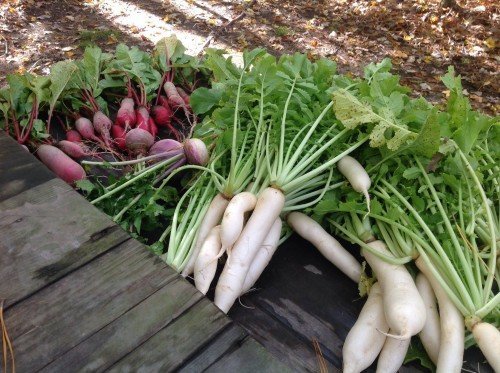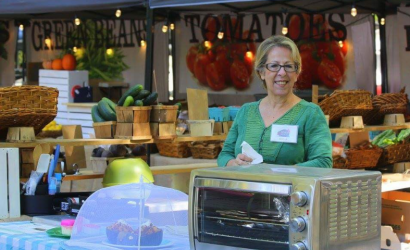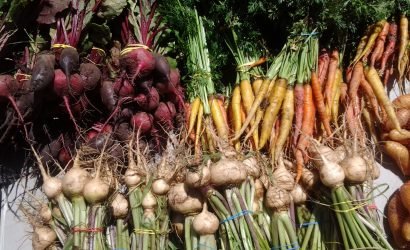CSA’s, or Community Supported Agriculture, fill a particularly deep void in our area, providing people with the opportunity to buy local, seasonal food directly from a farmer. It may seem ironic (considering Delmarva is a patchwork of farmland) that buying fresh, local produce isn’t an easier feat, but unless you are a farmer, or know one well, local produce can be hard to come by. We sat down with Christie McDowell from The Good Farm this week to discuss CSA’s, local farming, and the benefits of sourcing your food locally from a trusted source.
For starters, let’s get to the heart of what a CSA is. A typical CSA allows participants to buy into ‘shares’ of a farm’s produce. That money goes towards a variety of needs on the farm, from seeds to equipment to staffing. In return, shareholders receive a box of seasonal produce weekly, throughout the farming season. There are a number of benefits, most notably, having access to fruits and vegetables at the peak of freshness. If you’ve ever looked at a locally grown vegetable next to a vegetable that’s been shipped in from thousands of miles away and laden with preservatives, than you know what we’re talking about. Even the flavors are different. What’s more, you get to actually meet and converse with the person that is growing your food, which means you can ask questions about growing practices, pesticides, recipes, cooking instructions, etc…Perhaps our favorite part is that you reduce your carbon footprint drastically when you buy local. And, you are supporting local!
One major pitfall of CSA’s is that you might find yourself with too many vegetables some weeks or with too many of certain veggies that you don’t care for. After a few years of operating her CSA, McDowell decided to take her customers suggestions to heart, and come up with a new method. Some other common complaints were that missed pickups meant lost money, or for the seasonal Delmarvan, that they weren’t residing locally at the beginning or end of the farming season. Another common complaint came from people with food allergies, for example customers that avoid corn in their diets. The solution? A more tailored version of the traditional CSA.
“We are making it about the person that supports us,” explained McDowell. “I want it to be more about it working for you, the consumer.” McDowell took note of all of the complaints and concerns her customers had voiced – “they are completely valid complaints, which is why I really like the new model. I’ve found that a lot of people don’t like every type of vegetable.” This year’s CSA at The Good Farm will allow participants to pick how much you want to spend on your CSA account, from $50 to $500. You then decide the produce you want, how much you want, and when you want to get it. There’s even an off-season incentive: shares purchased in January receive a 20% premium over the share price, February earns 15%, March earns 10%, and April earns 5%. So for example, if you buy a $200 share in January, you will receive an additional $40 in your CSA account. Pickups will be available at the farm, as well as at the Ocean Pines Farmer’s Market on Saturdays from 8am to noon, and at the Fenwick Island Farmer’s Market Mondays and Fridays from 8am until noon.
In addition to a wide variety of herbs, greens and vegetables, The Good Farm CSA also offers microgreens. Additional benefits include: invitations to farm dinners, 10% discount on The Red Doors kids’ events, 1 herb starter and 2 veggies starters, the opportunity to buy grass-fed beef at community prices, and a weekly newsletter with recipes. Our favorite benefit is knowing that all of the produce is grown with care, with no chemicals, pesticides or fertilizers.
McDowell pointed out that the greatest benefit of buying local or participating in a CSA is being able to ask the farmer questions about how the food was grown. “You have to ask. No matter what the farm name is or what the labels claim, you just have to ask,” she said, explaining how easy it is for companies and farms to skirt the truth and claim to be ‘organic’ or ‘all-natural.’ The truth comes from getting to know who you are buying from, and how they produce your food.
As a result, McDowell takes an active interest in the local food movement. “I love encouraging other people to grow. I would love to see food become smaller and more local and more specialized in our area.” The Good Farm also encourages volunteers and kids to come out, roll up their sleeves, and become involved in the process. Ocean City Elementary students will visit the farm this year for field trips, children’s events are held throughout the year, and they’ve even had a few birthday parties hosted at the farm. Local high school students have also completed their service learning hours at the farm, which McDowell noted was always a rewarding experience as the students enjoy being able to see the results from their hard work. “The kids feel like they are really making a difference here.”
McDowell also enjoys the community bonds that form amongst the volunteers each season. “It’s a great network of people, I love seeing people, in person, getting to know one another. I didn’t realize how much I would enjoy hearing the interactions between volunteers. It’s really a great assortment of folks.” Volunteers are needed for just about anything…weeding, planting, harvesting, packing vegetables for market, social media, grant writing, organizing seeds, etc…
In addition to the annual CSA program, The Good Farm produce can also be found at the Farmer’s Market in Ocean Pines and in Fenwick. Or stop by the farm and say hello! For more on The Good Farm, their CSA, or local produce, visit their FB page or their website.








